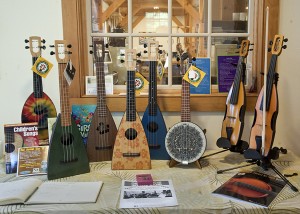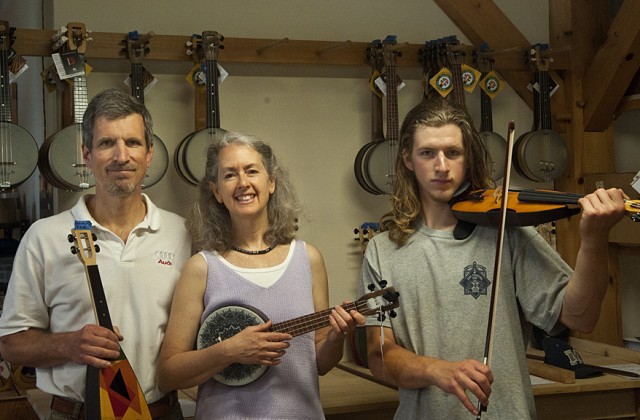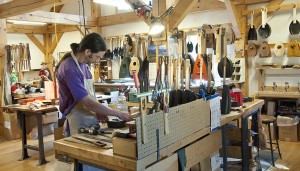Ukes Rule In Sheffield
By Bob Bumcrot
For a delightful short summer break, take a spin up Route 7 to The Magic Fluke Company at 292 South Main Street in Sheffield, the largest maker of ukuleles in America. Walk through the museum-like displays showing the history of the instrument. Try strumming a few notes on the beautiful soprano, tenor, baritone or concert Flukes, Fleas, Banjo Ukes and, if you know how to wield a bow, the new Cricket violin. Meet the owners Phyllis and Dale Webb and their son Josh, a mechanical engineering sophomore at UMass Amherst who has worked in the factory since he was five years old.

The Webbs produce a variety of instruments, from their trademark ukes to a banjo and the Cricket (right).
The Queen believed that the word ukulele derived from two Hawaiian words signifying “the gift that came here.” Others claim it comes from a phrase roughly translated as “jumping flea,” perhaps imitating the rapid fluttering hand movements of a good player. This second derivation is reflected in Magic Fluke’s names for its instruments: Flukes and Fleas. “Cricket for the violin comes from Jiminy Cricket (of Pinocchio), who played the fiddle,” said Dale Webb. “Also, the way a cricket makes its sound is really like drawing a bow across a string.”
America’s romance with the ukulele started in the roaring twenties with Ukulele Ike and young blades in raccoon coats driving Stutz Bearcats, went on with “the old redhead” Arthur Godfrey on radio and TV in the 40’s and 50’s, and continued through Tiny Tim’s “Tiptoe Through The Tulips.”
The most recognized current exponent of the instrument and its music, with volumes of arrangements, recordings and a definitive history is Jumpin’ Jim Beloff, a one-time professional guitarist, who happens to be Phyllis Webb’s brother.
While Josh and his younger brothers, Ben and Sam, are decent players, their parents are mere beginners, concentrating on manufacturing and marketing. They started the business in the basement of their New Hartford home in 1999 and moved to Sheffield three years ago. Instruments are sold at the factory, but most of the business is done through mail order and shipping to stores in 27 states, three provinces and 15 countries. To date, about 55,000 instruments have been sold. “We won’t get rich,” said Dale, a mechanical engineer who left corporate America to start the company, “but it’s a good, happy job.”
It usually takes about a week to assemble a uke or violin. “In a pinch, we could do one in a day,” said Dale. “We are passionate about local production and environmental preservation,” said Phyllis. Most of the wood is locally sourced, including walnut harvested from Dale’s father’s land near Amenia, New York. Injection molding of many of the backs of the instruments is done in Pittsfield.The maple, mahogany and walnut necks for the Cricket violin are milled at Kingsland Company here in Norfolk. “The wood block is shaped and drilled by our top-of-the-line computer-numerical-controlled machines,” said Kingsland’s Liane Burke. “They are placed in a jig and finished, then cut into two necks.”
“At first the Webbs were worried about the ecological implications of our use of mahogany,” added her husband Mark. “But they agreed after we explained that we were using scrap pieces that would otherwise just be burned.”
To learn the ukulele, consider joining the Berkshire Ukulele Band in Great Barrington, which offers free lessons and has a lot of fun. To hear some great players, be sure to attend the Uke ‘n Brew on August 24 from noon to 5 p.m. at Sheffield Town Park (left from Route 7 on Miller just before the pub). Acts will include The Lords of Lichtenstein, Monica Rizzio, The Ladies Auxiliary Ukulele Orchestra, The Humblebees and the one and only Liz and Jumpiní Jim Beloff.
Photos by Bruce Frisch.


